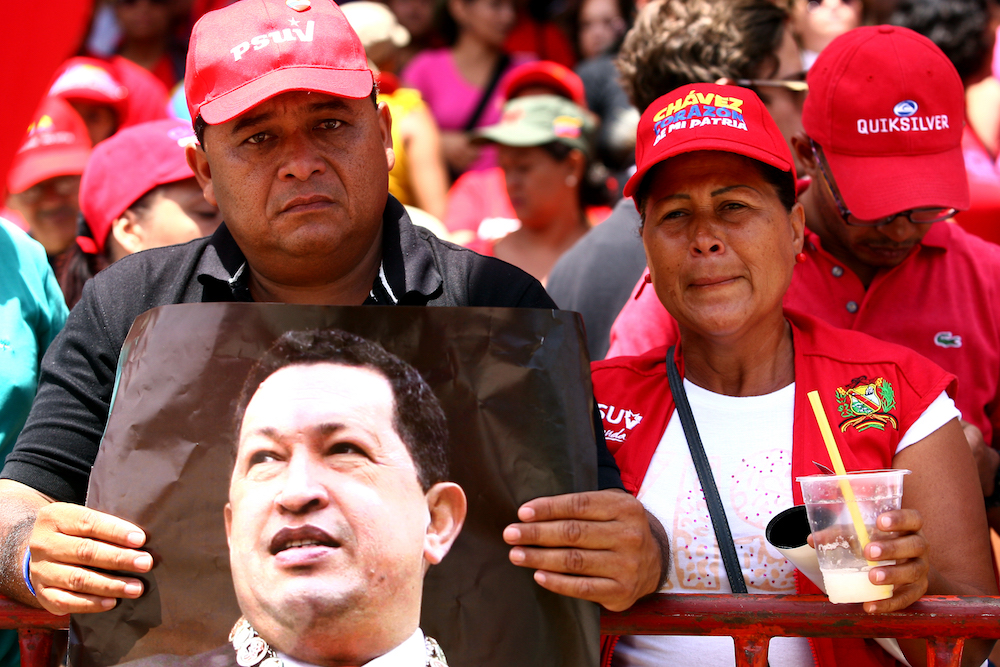Click here to read more of the decade’s 10 biggest stories.
WHO WAS INVOLVED: Hugo Chávez, Venezuela’s longtime president; Nicolás Maduro, Chávez’s successor; the Venezuelan public
WHAT HAPPENED: The mastermind of the Bolivarian Revolution was diagnosed with cancer in June 2011 and pronounced dead in March 2013, two months into his fourth consecutive term in office. Leaders in Venezuela (and many around the world) grieved his passing; President Ahmadinejad of Iran, a close ally, even declared a national day of mourning.
It was a decisive moment for the country. In the elections following his death, Venezuelans would have to choose either to embrace Chávez’s socialist party and its Bolivarian project or to reject it and start a new chapter in the country’s history.
They chose the socialists, just barely. Nicolás Maduro, Chávez’s handpicked successor, beat centrist Henrique Capriles by a one-point margin. Lacking Chávez’s charisma and political instincts, Maduro quickly lurched down a path toward authoritarianism as the country’s economy descended into chaos.
WHY IT REALLY MATTERED: The death of the iconic socialist leader set in motion the political, economic and humanitarian crisis that plagues Venezuela today and has disrupted much of Latin America. In the aftermath of Chávez’s death, Venezuela has become synonymous with corruption, human rights abuses, and economic collapse.
Maduro quickly doubled down on Chávez’s consolidation of power and dismantling of Venezuela’s democratic institutions. With the opposition in majority in the National Assembly, Maduro stripped the legislature of its powers in March 2017, transferring them to a Supreme Court he had packed with loyal judges. Things only went downhill from there. 2018’s presidential elections were denounced worldwide as fraudulent: would-be rival candidates were jailed and voters coerced, leading a large segment of the population to stay home from the polls. “Maduro became Machiavellian and the only thing that matters to him is hanging onto power,” former Chávez advisor Heinz Dieterich would say later.
The world economy threw in another wrench. In 2014, the commodities boom that had helped sustain Chávez’s regime — oil accounted for 90% of Venezuela’s exports — came to an end. Oil prices tanked by more than 50%, eviscerating the revenue stream the government had used for social programs and welfare initiatives vital to rallying the chavista base. Price and currency-fixing, a staple policy practiced by Chávez, was continued by Maduro, with inflation soaring above 1,000,000% and rendering the Bolívar worthless and a virtual dollarization of the economy.
As 2020 approaches, the Bolivarian Venezuela that Chávez envisioned has been swapped for a totalitarian dystopia. Maduro and his allies hold onto power through terror and suppression, including the jailing of political opponents, squelching of the press and use of lethal force against opposition demonstrators. According to a scalding UN report this year, extrajudicial killings by government forces rank in the thousands. Supermarket shelves are bare of food, leading to a mass exodus of over five million Venezuelans since 2014, the largest-ever refugee crisis in Latin America.
Meanwhile, the rest of the world looks on. Dozens of countries have recognized opposition leader Juan Guaidó as the country’s legitimate president. And for surging right-wing parties from Rome to Washington to Brasília, the wreck of Chávez’s once vibrant revolutionary state has created a convincing socialist bogeyman ripe for demonization.
—
Manzali de Sá-Kaye is AQ’s editorial intern







